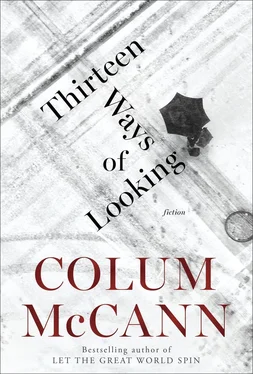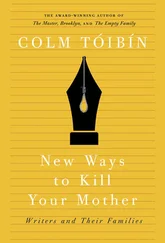She wasn’t sure if she had said this aloud or not, but when she looked up again the female detective had brought one of Tomas’s shirts, held it out, her eyes moist. The buttons were cold to the touch: Rebecca pressed them to her cheek.
From the laneway came the sound of scraping branches. Van doors being opened and closed. She heard a high yelp, and then the scrabble of paws upon gravel.
—
SHE SPENT THAT MORNING out in the fields. Columns of sunlight filtered down over the sea. A light wind rippled the grass at the cliff edge. She wore Tomas’s shirt under her own, tight and warm.
So many searchers along the beaches. Teachers. Farmers. Schoolchildren holding hands. The boats trawling the waters had trebled.
At lunchtime, dazed with fatigue, Rebecca was brought home. A new quiet had insinuated itself into the cottage. The policemen came and went as if they had learned from long practice. They seemed to ghost into one another. It was almost as if they could slip into one another’s faces. She knew them, somehow, by the way they drank their tea. Food had arrived, with notes from neighbors. Fruit bowls. Lasagna. Tea bags and biscuits. A basket of balloons, of all things. A scribbled prayer to Saint Christopher in a child’s hand.
Alan sat down next to her on the couch. He put his hand across hers. He would, he said, do the media interviews. She would not have to worry about it.
She heard the thud of distant waves. The labored drone of a TV truck filtered down from the laneway.
A Sunday newspaper called, offering money for a photograph. Alan walked to a corner of the cottage, cupped his phone, whispered into the receiver. She thought she heard him weeping.
Pages from the Israeli novel were strewn across her desk. Scribbles in the margins. Beside the pages, Mandelstam’s memoir lay open, a quarter of the way through. Russia, she thought. She would have to tell them in Vladivostok, let them know what had happened, fill out the paperwork. The orphanage. The broken steps. The high windows. The ocher walls. The one great painting in the hallway: the Bay of Amur, summertime, a yacht on its water, water, always water. She would find the mother and father, explain that their son had disappeared swimming on the western seaboard of Ireland. A small apartment in the center of the city, a low coffee table, a full ashtray, the mother wan and withdrawn, the father portly and thuggish. My fault. I gave him a wetsuit. All my fault. Forgive me.
She wanted the day to peel itself backward, regain its early brightness, its possibility, its pour into teacups, but she was not surprised to see the dark come down.
Alan sat in the corner, curled around his phone. She almost felt a sadness for him, the whispered sweetheart, the urgent pleading and explanations with his own young children.
She totaled up the hours: forty-eight. That night, lying next to him, Rebecca allowed his arm across her waist. The simple comfort of it. She heard him murmur her name again, but she did not turn.
In the morning she rose and walked out behind the house, the dew wet against her plimsolls. The television truck hummed farther up the laneway, out of sight. She stepped across the cattle grid. The steel bars pushed hard into the soles of her feet. A muddy path led up the hill. The grass in the middle was green and untrodden. Moss lay slick on the stone wall.
A piece of torn plastic was tangled in the high hedges. She reached in and pulled it out, shoved it deep into her pocket: she had no idea why.
Water dripped from the branches of nearby trees. A few birds marked out their morning territory. She had only ever driven this part of the laneway before. It was, she knew, part of an old famine road.
Rebecca stood a while: the hum from the TV truck up the road seemed to cancel the rhythm of the sea.
She leaned into the hard slope of the road, opened the bar of the red gate, stepped over the mud. The bolt slid back perfectly into its groove. She walked the center grass up and around the second corner to where the TV truck idled against the hedges. Inside, silhouetted against a pair of sheer curtains, three figures were playing cards. The curtains moved but the figures remained static. Across the front seat a man lay slumped, sleeping.
A small group of teenagers huddled near the back of the truck, sharing a cigarette, their breath shaping clouds of white in the cold. They nudged each other as she approached.
She stopped, then, startled by the sight. Alone, casual, adrift. He sauntered in behind the group, unnoticed. A brown hunting jacket hung from his shoulders. A hooded sweatshirt underneath. His trousers were rolled up and folded over. The laces of his boots were open and the tongues wagged sideways. Steam rolled off him, as if he had been walking a long time.
His mouth was slightly open. His lip was wet with mucus. Mud and leaves in the fringes of his hair. Under his right arm he carried a dark bag. The bag fell from his arm, and he caught hold of it as he moved forward. A long, gray stripe. The wetsuit. He was carrying the wetsuit.
Sh’khol. He had not yet seen her. His body seemed to drag his shadow behind him: slow, reluctant, but sharp. She knew the word now. Shadowed.
The door of the TV truck opened behind her. Her name was called. Mrs. Barrington. She did not turn. She felt as if she were skidding in a car.
She was aware of a bustle behind her, two, three, four people piling out of the truck. The impossible utterance of his name. Tomas. Is that you? Turn this way, Tomas. A yell came from the teenagers. Look over here. They had their phones out. Tomas! Tomas! Turn this way, Tomas.
Rebecca saw a furred microphone pass before her eyes. It dipped down in front of her, and she pushed it away. A cameraman jostled her. Another shout erupted. She moved forward. Her feet slipped in the mud.
Tomas turned. She took him in her arms. A surge of joy.
She held his face. The paleness, the whites of his eyes. His was a gaze that belonged to someone else, a boy of another experience.
He passed the wetsuit to her. It was cold to the touch and dry.
—
THE NEWS WENT AHEAD of them. The cheers went up as they rounded the corner toward the garden. Alan ran along the laneway in his pajamas, stopped abruptly when he saw the television cameras, grabbed for the gap in the cotton trousers.
Rebecca shouldered Tomas through the gauntlet, her arm encircling him tightly, guiding him to the front door.
In the cottage, a swathe of light dusted the floor. The female detective stood in the center of the room. Her name badge glinted. Detective Harnon. It struck Rebecca that she could name things again: people, words, ideas. A warmth spread through the small of her back.
A smell of turf smoke came off Tomas’s clothing. It was, she later realized, one of the few clues she would ever get.
The cottage filled up behind her. She saw a photographer at the large plate-glass window. All around her the phones were ringing. The kettle whistled on the stove. A fear had tightened Tomas. She needed to get him alone. The photographer shoved his camera up against the windowpane. She spun Tomas away as the flash erupted.
Morning light stamped itself in small rectangles on the bedroom floor. Rebecca closed the window blinds. The helmet was lying on the bed. His pajamas were neatly folded and placed on a chair. She ignored the knocking at the door. He was shivering now. She held his face, kissed him. He looked away.
The door opened tentatively.
— Leave us be, please. Leave us be.
She touched the side of his cheek, then shucked the brown jacket from his shoulders. A hunting jacket. She checked the pockets. A few grains of thread. A small ball of fur. A wet matchbook. He lifted his arms. She peeled the sweatshirt up over his head. His skin was tight and dimpled.
Читать дальше












